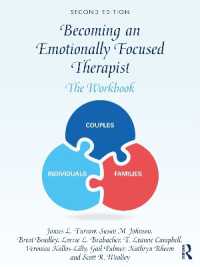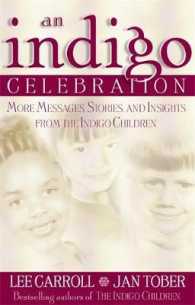- ホーム
- > 洋書
- > 英文書
- > Biography / Autobiography
Full Description
No Past Tense is the biography of Katarina (Kati) Kellner and William (Willi) Salcer, two Czech Jews who as teenagers were swept up by the Holocaust in Hungary and survived Auschwitz and Mauthausen, respectively.
Covering their entire lives, weaving in first person "real time" voices, the unique structure of No Past Tense provides a distinctive "whole life" view of the Holocaust.
The book begins with their childhoods, education in Budapest, and 16-year-old Kati meeting 19-year-old Willi in the Jewish ghetto in Plesivec, a Slovak village annexed by Hungary in 1938. After liberation from the camps they returned to discover most Jews were gone, and the villagers did not want them back. In defiance, Kati took up residence in a shed on her family's property, and in reclaiming what was hers, won Willi's heart.
They lived as smugglers in post-war Europe until immigrating illegally to Palestine in 1946. In 1958, saying he did not want the children to know war, Willi convinced Kati to move to America. He did not tell her that punitive tax fines, imposed when the government needed money due to the crisis in the Sinai, shook his faith in Israel. Once in America, after a few bad investments, Willi lost all their money and for the first time Kati suffered panic attacks. But Willi rebuilt his fortune, while Kati rediscovered her courage, and started living again.
Contents
Contents
Foreword
Prologue
Introduction
1. Hitler on the Radio: Summer 1938
2. Worried Mothers: 1939
3. Happy New Year: 1944
4. Back Home: 19 March 1944
5. Into the Ghetto: April 1944
6. Kati Meets Willi: April 1944
7. Harsher Reality: April 1944
8. Spoiled Little Girl: June 1944
9. Auschwitz: June-August 1944
10. No Escape: September-October 1944
11. Canary Girls: November 1944
12. This is Mauthausen: November 1944-March 1945
13. Walking to Czechoslovakia: March-May 1945
14. Liberation: April 1945
15. No-One Home: June 1945
16. Finding Lily: June 1945
17. Family Album: June 1945
18. Give Up the Shiksa: July 1945
19. Gardener's Shed: August 1945
20: Polka Dot Dress: August 1945
21. Nice Jewish Girl: August 1945
22. In Remembrance: August 1945
23. Ghosts: August 1945
24. Uncle Pavel: September 1945
25. Marry Me, or Goodbye: October 1945
26. Hakshara: February 1946
27. Black Hat with Cherries: Summer 1946
28. Jewish Soldier: August 1946
29. Atlit: August-November 1946
30. We're Here: November 1946-February 1947
31. It's a Girl: February-September 1947
32. Too Much Beer: Fall 1947
33. Up on the Roof: November-December 1947
34. Building Tanks: December 1947-May 1948
35. Testing: Summer 1948
36. Water, Everywhere: Summer 1949
37. What Next?: 1950-1952
38. We'll Build You a Factory: 1953
39. Crisis: 1954-1957
40. Going Down: 1958-1959
41. Europe to America: Winter-Spring 1960
42. First Year in America: 1960-1961
43. Job Hunt: 1961
44. Plastic Lace Tablecloths: 1961-1964
45. Naomi and the Gypsy: Summer 1968
46. Home Sweet Plesivec: Summer 1968
47. Jelsava and Back: Summer 1968
48. Young, Single and Free: 1975
49. Wander Years: 1977-1983
50. Telling: 1996-1999
51. The End: 2000-2001
Epilogue








